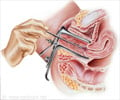Post Menopausal Bleeding (PMB)
Menopause is the time when the menstrual periods in a women come to a stop and occurs usually between the ages of 45 and 55 years.
There should be a complete stoppage of menstrual cycle for at least a year before a definite diagnosis of menopause can be made.
Any form of vaginal bleeding is considered abnormal in post- menopausal women. In most instances when post-menopausal bleeding (PMB) evaluation is done no significant cause is found; however, PMB can also point towards an underlying ominous condition such as endometrial hyperplasia (a pre-cancerous state) or endometrial cancer. It should, therefore, never be taken lightly.
In most instances PMB is caused by use of new or different HRT drug, nutrional deficiency, drastic weight loss or extreme stress.
Oestrogen and Bleeding - Some of these women are on Hormone Replacement Therapy (HRT) and they may experience vaginal bleeding due to the increased sensitivity of the inner uterine lining (called endometrium) to oestrogen hormones tablets. Sexual Intercourse and Bleeding - During and after menopause there is vaginal dryness due to decreased secretion of mucus and lack of proper lubrication. Friction caused by aggressive sexual intercourse in such a situation can lead to bleeding due to abrasion of the mucosa. However if such bleeding occurs regularly it may indicate a pathology in the vagina or cervix.
Other causes of PMB include:-
- Benign Polyps and fibroids in uterus. Usually the polyps cause only light bleeding as a small area is involved whereas fibroids are associated with heavy bleeding due to larger section of the uterine cavity being involved.
- Hyperplasia of uterine lining cells as mentioned previously – an endometrial biopsy may be necessary for diagnosis of the condition.
- Any cancer of the uterus, vagina or cervix or ovaries.
- Warfarin, aspirin, clopidogrel or any other ‘blood thinning’ tablets may also cause to PMB.
When should you consult your doctor -
Contact your doctor as soon as possible if you have: –
- Started bleeding one year after stopping of menstrual cylces
- The duration of bleeding is for over two weeks
- Require to change your pads regularly every hour during the day
PAP Smear or having an Endometrial biopsy – If the bleeding is due to suspicious areas on the cervix, a PAP smear is taken and this is done as an office procedure and does not require admission and has no complications associated with it. The results take three or four days to be revealed.
If the bleeding is due to thickened or suspicious looking uterine lining, an endometrial biopsy maybe required. Sometimes it is done as a day procedure (admit in the morning and discharge in the evening) and is carried out under the influence of a short anesthesia. At other times it is done as an office procedure when only a small sample of an area is required. Analgesics should be taken afterwards as you may experience cramps in the abdomen. A pad should be worn for two or three days as some spotting may occur. Avoid using an internal pad like tampons as this can cause infection. You should report back to the doctor immediately if there is abnormal bleeding or multiple cramps.
 MEDINDIA
MEDINDIA
 Email
Email











I am a 47 year of women, began my period at age 11. I have not had a period for 17 months. All of a sudden I have started bleeding 4 days still hasn't stopped.